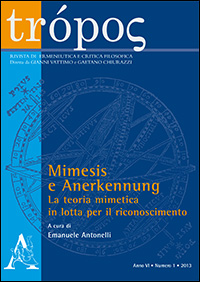Gli uomini saranno dèi gli uni per gli altri
Sui fondamenti agostiniani dell'antropologia di Girard
DOI:
https://doi.org/10.13135/2036-542X/7783Parole chiave:
Mimetic theory, Recognition, Agustinianism, Self-love, JustificationAbstract
In this paper, I reinterpret Rene Girard's anthropology, specifically the questions of desire and need for recognition, in the context of Augustinian philosophy. Focusing on Girard first book, Mensonge romantique et vérité romanesque, I place the mimetic theory within the tradition of moralists like Pascal, who wielded great influence in French literature and moral culture. In this context, Girard's conception of desire is shown as a continuation of Jansenist anthropology of amour-propre. In particular, Girard inherits from this tradition the idea that the man is marked by ontological lack, which is a consequence of the original sin. This ontological lack is expressed as a constant and insatiable desire of recognition: the man is a finite and inadequate being, and as such cannot find confirmation in himself, therefore he has to invest in a social sphere to justify his own existence. In man's heart, the place that was once occupied by the divine, is filled by the Others. The Others act as mundane gods who are capable, by their power to grant and to deny recognition, to justify (or not) the value of an individual life. By putting the question of recognition in erotic context, the Augustinian tradition allows us to explain a connection that exists between narcissism and object relations: the recognition that is expected from the others is in fact a transposition of the love of oneself. This interpretation emphasises that originality of Girard's mimetic theory is relative, considering it also in a dialogue with the antropology of his contemporaries, such as developed in Pierre Bourdieu's Pascalian Meditations. The paper also sheds a new light on the theological aspects of Girard's thought, showing that his definition of a man is deeply Christian in its cultural origin.



